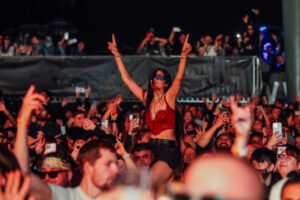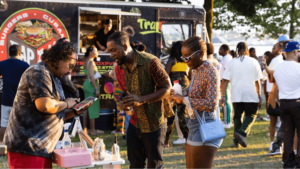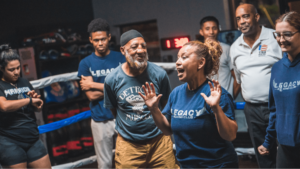When it comes to success in the music industry, connections are often worth more than cash. But networking in the music industry doesn’t involve name badges or stuffy dinners — it’s all about an authentic, shared love of the art.
So how do you intentionally — and authentically — grow your network of agents and artists? And how can you get your foot in the door if you’re new to the space?
To find out, we turned to Adam Lynn of Prime Social Group, the midwest promotion company behind festivals like 90s Fest, #Fest, and Abroadfest. Listen to the full podcast, or keep reading for highlights from the interview.
Stream the full podcast with Prime Social Group here.
On getting his start in the music industry:
“For my first concert, I was a junior at the University of Michigan, and I felt like there was a big demand for concerts and no supply. So in ‘09 I wanted to bring the one and only Nas to University of Michigan. I sent probably twenty emails and got no responses.
“I was so passionate about it that I got on a flight to New York, and met with his agent in person to pitch the whole thing. That’s how this industry works — it’s based on relationships and performance. I promoted the heck out of that show, which was quite a way to break into the music industry. You’ve got to make a name for yourself.”
On the importance of networking in the music industry:
“It’s so hard to get anyone on the phone when you’re starting. You’ll learn very quickly that the artist booking process is a difficult hurdle.
“Align yourself with the right people. If you don’t have the clout, talk to other promoters and use any personal relationships that can help get you in the door. That’s the key — to get yourself in the door. And once you’ve proven yourself and built your network, it becomes a much easier process.”
On promoting across genres:
“We’ve diversified our portfolio. I’m not just riding the EDM wave, or just trap music or underground music. We’re spread across different genres and different markets. If Ann Arbour is having a really bad ticket year, Madison might be having a great year.
“Although we’re at a good time in the company, we’ve had plenty of rough times and have taken some big hits. You’ve got to be able to weather it financially, and from a mental capacity. You’ve got to be able to make a lot of money and then lose it all on a show, and be able to rebound.”
On building a festival experience:
“If you set up the right atmosphere, you’re going to create a branded event that doesn’t have much to do with who’s performing. It’s more about being at a fun event than seeing any particular artist.
“At some point, the talent becomes repetitive. What separates your event from the next festival in the next city over? You’ve got to create something that’s a memorable experience.
“That’s what we did with AbroadFest, which caters to study abroad students in Europe. We created an ‘experience event’ where students congregate in Barcelona for a weekend. We’ve done such a good job with it over the past three years — this year we even sold out the whole festival before we announced who was playing. That’s the point where talent becomes secondary and your event and the festival experience comes first.”





